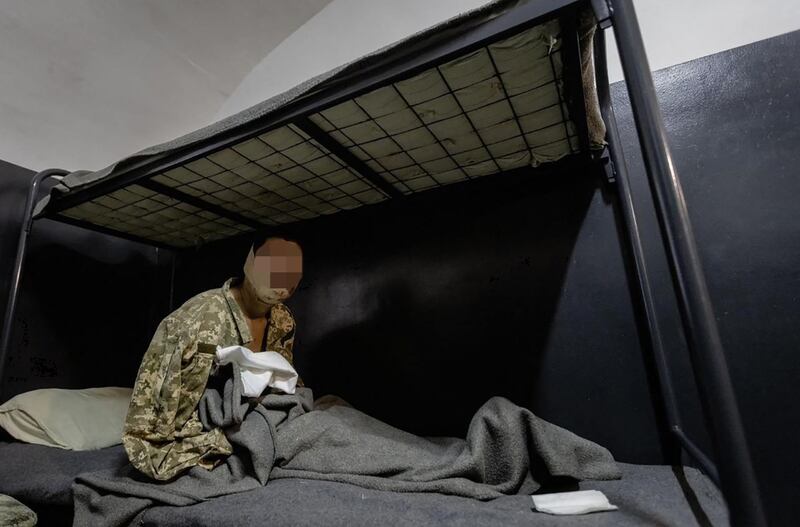TAIPEI, Taiwan – A North Korean soldier captured in Russia’s Kursk region has reportedly expressed his desire to defect to South Korea, which has said it would accept him.
Legally, South Korea recognizes all North Koreans as citizens under its constitution. This means that any North Korean, including a prisoner of war, or POW, is entitled to South Korean nationality upon arrival.
However, the process is not as straightforward as simply crossing the border.
What would be the process?
Since the North Korean prisoner is in Ukraine, his transfer to South Korea would require diplomatic negotiations between Ukraine and South Korea. If Ukraine agrees to facilitate his departure, he could be transferred either through a third country or directly to South Korea. The South Korean government may also work with international organizations to ensure a smooth and legally compliant transfer.
Once in South Korea, the man, like all other North Koreans coming to the South, would undergo a vetting process by South Korea’s main spy agency, the National Intelligence Service.
He would first be taken to a secure facility, where intelligence officials would assess his background, potential security threats, and any valuable information he might have. This process can take several weeks or even months. If he is deemed to have no ill intent, he would be transferred to Hanawon, a resettlement center for North Korean defectors, where he would undergo training to adapt to South Korean society.
After this period, he would be integrated into South Korean society with government support, including financial assistance and job training.

Have there been similar cases?
There have been instances of captured North Korean soldiers defecting to South Korea, though such cases have been rare in recent years.
Historically, North Koreans captured during the Korean War had the choice to stay in South Korea, return to the North, or relocate to a third country. Many chose to remain in South Korea, while some resettled in other places such as Taiwan and the United States.
Beyond POWs, several high-profile North Koreans have defected to South Korea, including senior military officers, diplomats, and even a member of Kim Jong Un’s family.
Notable figures include Hwang Jang Yop in 1997, the highest-ranking North Korean official to defect, who was the architect of the North’s Juche ideology of self-reliance, and Thae Yong Ho in 2016, a former North Korean diplomat in the U.K. who defected to South Korea, later becoming a National Assembly member.
Kim Kuk Song, a senior North Korean intelligence officer who defected to the South in 2021, provided valuable insights into Pyongyang’s covert operations.
What happens if he arrives in South Korea?
While the South Korean government provides defectors with various forms of support for settlement, including financial aid, housing and job training, many struggle to adapt due to cultural differences, social discrimination, and economic hardship.
According to media reports, defectors often face difficulties finding stable employment and integrating into South Korean society, as they usually lack the necessary skills and networks to compete in the job market.

Additionally, mental health issues, including post-traumatic stress disorder, are common due to the harsh conditions they endured in North Korea and during their escape.
Discrimination against North Korean defectors remains a significant issue in South Korea as well. Many South Koreans view defectors with skepticism, sometimes perceiving them as outsiders or even possible spies.
This prejudice makes it difficult for defectors to form social connections, find good jobs or be fully accepted in mainstream South Korean life.
Some defectors report being openly stigmatized in workplaces, schools, and even within their communities. The South Korean government has made efforts to address this discrimination through awareness campaigns and policy initiatives, but challenges persist.
How could South Korea use the POW for propaganda?
The prisoner’s background as a soldier sent to Russia makes him a unique case, and his defection could provide South Korea with intelligence on North Korea’s military cooperation with Russia, making him a valuable propaganda tool.
Historically, South Korea has leveraged high-profile defectors for propaganda purposes. When Hwang Jang Yop defected, he was frequently used to criticize the North Korean regime.
Likewise, Thae Yong Ho has been a vocal critic of Kim Jong Un’s leadership and has appeared on South Korean media and in political settings.
The North Korean prisoner could be used to highlight North Korea’s human rights abuses, poor conditions within its military and any questions over the loyalty of its soldiers.
His testimony could be used in media campaigns, diplomatic discussions, and international forums to highlight North Korea’s involvement in Russia’s war in Ukraine.
Psychological warfare tactics, such as loudspeaker broadcasts at the demilitarized zone between the two Koreas or targeted online messaging, could spread his story.
He could also be encouraged to join human rights organizations, raising awareness of Pyongyang’s policies.
RELATED STORIES
‘I want to defect to South’: North Korean soldier captured in Kursk breaks silence
Ukraine broadcasts appeal to North Korean soldiers to surrender
North Korea to punish people for spreading ‘rumors’ of soldiers dying in Russia
How might North Korea react?
North Korea and Russia have not officially acknowledged that North Korean soldiers have been sent to fight in Ukraine. If North Korea refuses to recognize this, it may simply dismiss the defector’s case as South Korean propaganda. Pyongyang could claim that Seoul is spreading false information to undermine it, a tactic it has used in the past when high-profile defectors have revealed sensitive information.
If North Korea chooses to respond, it could label the POW a criminal or traitor, claiming he was abducted or coerced into defecting by South Korea. This has been North Korea’s standard approach to high-profile defectors.
For example, North Korea accused Thae Yong Ho of embezzlement and child molestation – charges widely believed to be fabricated. Similarly, Shin Dong Hyuk, a well-known defector who exposed North Korea’s brutal prison camps, was accused of being a liar and traitor, in an attempt to discredit him.
If the defecting prisoner had sensitive military information, North Korea might take drastic measures, such as increasing border security to prevent future defections or punishing the defector’s relatives who remain in the North. In extreme cases, North Korea has even carried out assassination attempts against high-profile defectors abroad, as was the case with Kim Jong Nam, the half-brother of Kim Jong Un, killed by exposure to a nerve agent in Malaysia in 2017.
Edited by Mike Firn.
